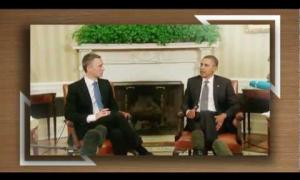Rhetorical Recap: Clinton Returns
September 16, 2016
“You know, the campaign trail doesn’t really encourage reflection, and it’s important to sit with your thoughts every now and then and that did help me reconnect with what this whole campaign is about.”
Speech in Greensboro NC, September 15, 2016.
This week the Clinton campaign hit the pause button for three days after a calamitous weekend of unforced errors. “Basket of Deplorables,” uttered in a lapse of awareness by yet another candidate (Hi Mitt!) lulled into thinking that being among rich donors provides insulation from the omnipresent digital eye and ear, became the most retweeted hashtag of the campaign year to date. Then came revelation of a mini-coverup of an illness that, yes, might reflect some sexism in how it was discussed, but was so characteristically a Clinton negative as to trigger joy and dread in the appropriate contestants’ corners.
This battleground-state event thus provided a chance for the Democrat to adjust persona, message, public relations, and public expectations for the debate. It was an occasion for a literal and perhaps rhetorical recovery speech.
Clinton had several overlapping options on how to address the lost weekend: an apology, an oxymoronic display of authenticity, and greater accessibility. Each was a plausible remedy that no doubt had its advocates in Brooklyn HQ.
***
First came another “A,” acknowledgment:
CLINTON: “You know, the campaign trail doesn’t really encourage reflection, and it’s important to sit with your thoughts every now and then and that did help me reconnect with what this whole campaign is about.”
She then cited her good fortune at being able to recuperate, in contrast to many working family members who can’t afford to. Those are the Americans who, she said, she is running for president to help.
Before outlining her solutions, she went authentic and apologetic.
CLINTON: “When it comes to public service, I’m better at the service part than the public part, but this is why I do it and this is who I’m in it for.”
Last time, she was in it to win it.
“Everywhere I go I’m going to talk about my ideas for our country. You know, my campaign has rolled out detailed plans in 38 different policy areas. Yes, somebody actually counted.”
The unabashed tough policy wonk, authentic indeed. As was the passive-aggressive contrasting that followed:
“Now, I confess, I’ll never be the showman my opponent is and that’s OK with me. Just look at– look at the show he put on with Dr. Oz today. But I am going to deliver for you and your family just like I did for Sarah [anecdotally invoked earlier in the speech] all those years ago with the Children’s Health Insurance Program that gave her the chance to be the extraordinary young woman she is.”
The solutions Clinton put at the top of her 38-point agenda are a living wage, quality health care, paid leave, and equal pay. “Showman” is a gritty word that she hoarsely delivered.
After the address, glory be, access was granted in the form of a ten-minute news conference. In her 2 ½ minute opening statement Clinton explained that she came here to give a positive personal speech about her vision, that she battled lots of noise and distraction, and wanted to give Americans something to vote for and not against. But next she attacked Trump’s dismissal of the Flint pastor who cut him off and piled on the against verbiage.
After fielding a Syria question cleanly, saddling Putin with key responsibility for the next move, she met her moment of reckoning for the lost weekend:
CLINTON: “This was an ailment that many people power through and that’s what I wanted to do.”
“Power through” is an appropriate rationale that could serve as a substitute slogan. Kudos to the candidate for not scapegoating her campaign and firing someone. And a bonus point for coming onstage to “I Feel Good” instead of “Fight Song.”
***
Hillary Clinton remains averse to answering open-ended questions for an extended period of time in the open from a group of people who have pointedly NOT paid for the privilege. The press is one such group; there are targeted voters in others. Roger Ailes arranged a suitable format for Richard Nixon to do this in 1968, a Q-and-A in the round, and the technique would work for Clinton. There’d be panache in filching Ailes’s technique, too.
To put it bluntly, there is nothing Clinton or any of her all-star surrogates can say to dispel the common perception that she is accessible only to high dollar donors. She can only dispel by repeatedly performing the deed of conversing with a few Americans with cameras intentionally rolling. Otherwise, she will have to win this election in spite of her debilitating penchant to be accessible only for pay.
More generally, I think the best message for Clinton to stress going forward would be an embracing, if not Khan-imitative brandishing, of the Constitution. “Stronger Together” can be aligned with “We The People” and “E Pluribus Unum.” Tying her policy positions to constitutional principles would reconnect with Sanders supporters desire for campaign finance reform and appeal to Republicans alarmed at the federal debt and impressed by the Reaganesque tones struck during the Democratic Convention in Philadelphia. (Clinton is slated to return to Philadelphia on Monday to speak to and about, but not necessarily with, millennials.) Many voters aren’t ever going to love Clinton. But they love the Constitution and believe it needs reform. Such an appeal would also contrast with Trump’s ignorant and authoritarian tendencies.
Assessment of and gratuitous advice for Donald the Third (as in number of campaign management teams) next time.



